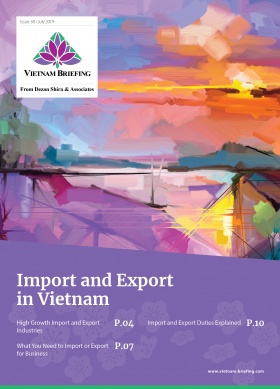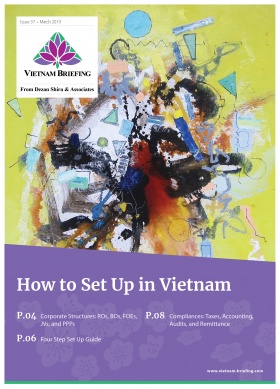Vietnam’s Improving Competitiveness: 2019 Global Competitive Index
- Vietnam jumped 10 places to rank 67 and was among economies that have improved the most globally from last year’s standings according to the 2019 Global Competitive Index.
- Vietnam ranked high in market size and ICT but needs to work on skills, institutions, and business dynamism.
- Nevertheless, investor confidence remains strong with the government keen on addressing shortcomings.
Vietnam’s business environment continues to improve according to the recently released 2019 Global Competitive Report produced by the World Economic Forum.
The report covers 141 countries accounting for 99 percent of global GDP. The report measures several factors and sub-factors, including institutions, infrastructure, ICT adoption, macroeconomic stability, health, skills, product market, labor market, financial system, market size, business dynamism, and innovation capability. A country’s performance is rated on a progressive score on a 1-100 scale, where 100 represents the ideal state.
The reported noted that despite a decade of low productivity, Vietnam with a rank of 67 improved the most globally and jumped 10 places from last year’s standings. It further added that East Asia is the most competitive region in the world followed by Europe and North America. Singapore came out on top, beating the US.
Vietnam ranks best for market size, ICT
Vietnam ranked best in terms of its market size and adoption of information and communications technology (ICT). Market size is defined by GDP and import of goods and services. ICT adoption is measured by the number of internet users and subscription to mobile-cellular telephones, mobile broadband, fixed internet, and fiber internet.
Vietnam performed the worst in skills, institutions and business dynamism. Skills are measured by analyzing the education and skill set of the current and future workforce in the country. Institutions are measured by security, transparency, corporate governance, and the public sector. Business dynamism is seeing how relaxed administrative requirements are for businesses and how the country’s entrepreneurial culture is faring.
The report also puts Vietnam with the lowest risk of terrorism and with the most stable levels of inflation.
Vietnam’s rise and its emergence as a manufacturing hub are now well known. Vietnam’s free trade agreements and low labor costs have incentivized investors to move operations allowing Vietnam to overtake China as a destination for export manufacturing. In addition, exports to the US have increased with a US$600 million surplus according to a Bank of America Merrill Lynch Study.
The country’s internet connectivity is spread out across the country with access to free Wi-Fi available at coffee shops, restaurants, shopping malls, and airports. Vietnam’s fast mobile data is among the cheapest in the world. In addition, while Vietnam is a large software exporter, it is now expanding into fields like fintech and artificial intelligence.
As Vietnam continues to grow, we look at factors highlighted in the report that the government is working to address in order to keep up with the sustained FDI.
Labor skill
The competitive index falls more or less in line with Vietnam’s economic growth. As Vietnam benefits from the trade war between Washington and Beijing, highly skilled workers are a premium. While fresh, unskilled workers are abundant, basic training still requires time. In addition, high skilled workers can demand a better package and companies are seeing higher turnover rates. While the situation is improving, the government will need to tackle this by establishing more vocational schools and technical centers to churn out high skilled workers.
Corporate governance
With increasing foreign investment into Vietnam, different approaches to corporate governance has led to a clash of standards and business practices. This tension is especially pronounced between Chinese-owned and Western-owned companies. With the number of free trade agreements signed, including the recent Comprehensive and Progressive Agreement for Trans-Pacific Partnership (CPTPP) and the European Union Vietnam Free Trade Agreement (EVFTA), Vietnam will need to update its corporate standards. In August, the State Securities Commission of Vietnam released the Vietnam Corporate Governance Code of Best Practices for Public Companies, laying recommendations on best corporate practices. However, in order to be successful, change can not only come from multinational companies but will be required from the government itself.
Several businesses have also noted that access to information is an ongoing problem. Investors report that access to legal documents can be problematic and sometimes requires ‘relations’ with officials.
Business dynamism
In the 2018 ease of doing business report, Vietnam while still competitive, dropped one spot to 69 from the previous edition. This shows that Vietnam still needs to work on its business procedures, which are more tedious than its ASEAN neighbors, such as Thailand, Malaysia, and Singapore. Starting a business takes an average of 18 working days along with a number of mandatory and time-consuming administrative procedures. In the recently released Provincial Competitive Index, entry procedures continued to be a concern for businesses with some saying that it can take over a month to complete all required paperwork apart from a business license to become legal. To address these issues, Vietnam has reduced registration fees and made content available online on enforcing contracts for companies entering the region.
Investor confidence remains strong
Nevertheless, FDI continues to pour in to Vietnam and the government is keen to improve the business environment in the country. The aforementioned factors do not reflect the country’s economic expansion in recent years as illustrated in this year’s competitive index. Vietnam’s greatest challenge is to manage its growth responsibly. The trade war and Vietnam’s free trade agreements has created enough reasons for foreign investors to enter and reap benefits from their investment. This pace is likely to continue in the medium to long term.
About Us
Vietnam Briefing is produced by Dezan Shira & Associates. The firm assists foreign investors throughout Asia from offices across the world, including in Hanoi and Ho Chi Minh City. Readers may write to vietnam@dezshira.com for more support on doing business in Vietnam.
- Previous Article How Air Pollution in Vietnam Affects the Business Environment
- Next Article Vietnam’s New Age Consumers: Generation Z







